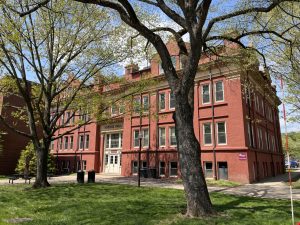Trump impeachment trial: A breakdown
January 30, 2020
For the past three months, Congress has been engulfed in a debate over whether or not President Trump’s withholding of military aid to Ukraine was an abuse of power based on political motives and whether or not he committed obstruction of justice in the subsequent impeachment investigation. This has escalated into an impeachment inquiry and trial which contains two articles of impeachment against the president. As Congress moves into the second week of the trial, Bloomsburg University students and first-time voters weighed in on the issue.
As far as Democrats are concerned, the president tried to exert his political influence to investigate unsubstantiated claims about his potential political opponent Joe Biden, specifically Biden’s son’s involvement on the board of a Ukranian gas company, Burisma Holdings Ltd, while he was still Vice President. President Trump withheld millions of dollars’ worth of military aid and made its release contingent on the announcement of an investigation according to the house.
Republicans maintain that it is a normal procedure to withhold aid and that it is within the president’s power to investigate corruption using any means necessary. President Trump and his lawyers also maintain that there is credible reason to believe that the Biden family was participating in illegal dealings in the country.
When it comes to the obstruction charge, Democrats believe that the president directed witnesses not to testify and ensured his staff did not turn over any documents that were requested via congressional subpoenas.
President Trump’s lawyers counter by saying that senior advisors to the president have always been exempt from having to testify to congress and that the president has the right to refuse giving documents based on executive privilege. They also refer to the fact that the subpoenas were issued before the rules for the inquiry had been voted on and approved, thus making the subpoenas non-enforceable.
The issue has contributed to the increased political division across the country, as many on the right see the trial as an attempt to undermine the president and the outcome of the 2016 election while those on the left see it as the most poignant example of Trump abusing his powers while in office. Several BU students were adamant on sharing their takes.
“I’ve always been supportive of Trump’s policies and I think he should be able to look into people who are doing shady things. It’s not an impeachable offense to be going after corruption regardless of who it involves, and just because those who don’t like the president want to remove him doesn’t mean they should be able to based on basically nothing,” said one BU student who wished to remain anonymous.
“He [Trump] clearly got caught in the act and has been making cover story after cover story about it in order to protect himself. It’s sad because the other side refuses to be objective about it and will follow him blindly no matter what,” said another BU student, a registered Democrat, who wished to remain anonymous.
It seems very unlikely that Trump will be removed from office given that the Republicans hold the majority in the Senate and are almost entirely unified in their defense of the president. But as the upcoming election draws near, it is clear that the results of the trial will certainly have an effect on how the candidates choose to campaign and what the rhetoric will be leading up to November.


















Jeanne Elias • Feb 1, 2020 at 10:42 AM
Nice job Kyle!